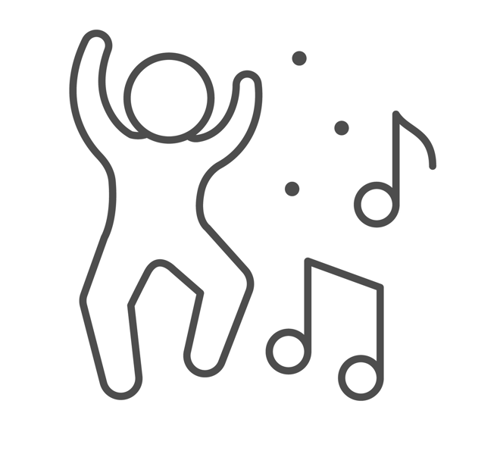Everyone should feel safe and secure in and outside of their home. We take issues of ASB very seriously and know the impact it can have on you and your family. That’s why we want to help.
If you are in immediate danger and your life is threatened, a crime is in progress or people are injured you should dial 999.
What is ASB?
Understanding what ASB is can help you deal with these situations better.
ASB occurs when someone is causing harm or distress to people outside their home in the neighbourhood.
Examples of ASB
 Setting fires in shared areas, lighting bonfires too close to buildings, or using fire pits unsafely.
Setting fires in shared areas, lighting bonfires too close to buildings, or using fire pits unsafely.
Arson
 Drinking in shared spaces, being loud or aggressive after drinking, or leaving bottles and cans behind.
Drinking in shared spaces, being loud or aggressive after drinking, or leaving bottles and cans behind.
Anti-social drinking
 Harassment and verbal abuse: repeatedly intimidating or threatening others, using offensive language, or arguing loudly.
Harassment and verbal abuse: repeatedly intimidating or threatening others, using offensive language, or arguing loudly.
Intimidation, harassment and verbal abuse
 Letting aggressive animals roam, not controlling pets, or keeping animals that might be unsafe for others.
Letting aggressive animals roam, not controlling pets, or keeping animals that might be unsafe for others.
Dangerous animals
 Leaving unwanted items or rubbish in shared spaces, dumping large items, or not disposing of waste properly.
Leaving unwanted items or rubbish in shared spaces, dumping large items, or not disposing of waste properly.
Dumping rubbish
 Arguing loudly in shared spaces, displaying aggressive behaviour, or using language that disturbs neighbours.Shouting, swearing and fighting
Arguing loudly in shared spaces, displaying aggressive behaviour, or using language that disturbs neighbours.Shouting, swearing and fighting
 Playing loud music, hosting late parties, or using noisy equipment at night.
Playing loud music, hosting late parties, or using noisy equipment at night.
Noise, including loud music and parties or unsociable hours
 Drawing on walls, damaging shared property, or breaking windows.
Drawing on walls, damaging shared property, or breaking windows.
Graffiti and vandalism
![]() Driving too fast in residential areas, blocking driveways, or driving in ways that make others feel unsafe.
Driving too fast in residential areas, blocking driveways, or driving in ways that make others feel unsafe.
Dangerous or inconsiderate driving
What isn't anti-social behaviour
We typically don’t investigate one-off incidents (unless there’s a crime or abuse reported to the police or another agency) or routine daily sounds and activities such as:
- Everyday living noises (footsteps, doors closing, lights turning on/off)
- Household activities (cooking smells, appliance use)
- Babies crying, people talking
- Low-level sounds from TVs or radios.
Resolving problems with a neighbour
If you have a problem with your neighbour, or your neighbour has a problem with you, it is important to try to resolve it as early as possible.
You may be able to resolve disputes and everyday nuisance problems by talking to your neighbour. Your neighbour may not be aware that they are causing a problem.
When you speak to your neighbour remember to:
- Keeps things friendly (they may not know that they are causing you issues)
- Go at an appropriate time
- Try not to interrupt if your neighbour starts shouting
- Explain the issues calmly – and highlight how the behaviour is affecting you/family members
- If the neighbour gets angry, make your excuses and walk away.
If you have spoken to your neighbour and matters do not improve then contact us.
Helplines and resources
Childline
The Childline website has lots of advice and support for children and young people experiencing abuse.
Crimestoppers
If you have information about people who commit hate crimes and do not want to talk to the police, you can contact Crimestoppers anonymously. You do not have to give your name, you will never have to give a statement to police, or go to court.
Domestic Abuse Support (DAVSS)
DAVSS is an award winning community based charity supporting any victims of domestic abuse, aged 16 years and above, in West Kent. Using a unique and highly effective professional volunteering model it provides vital support to clients who have experienced domestic abuse.
Galop
If you’ve experienced hate crime, sexual violence or domestic abuse, Galop is here for you. They support lesbian, gay, bi, trans and queer people who have had problems with the police or have questions about the criminal justice system.
Men's Advice Line
A confidential helpline for any man experiencing domestic violence and abuse from a partner (or ex-partner).
National Domestic Abuse Helpline
Call the National Domestic Abuse Helpline for free on 0808 2000 247, which supports women who are experiencing domestic abuse.
National Stop Hate UK
NSPCC
The National Society for the Prevention of Cruelty to Children is a British child protection charity.
To contact an NSPCC professional counsellor any time of day for help, advice and support, please visit their website.
Victim Support
Victim Support is the national charity giving free and confidential help to victims of crime, witnesses, their family, friends and anyone else affected. They are not a government agency or part of the police and you don't have to report a crime to the police to get their help. You can call any time after the crime has happened, whether it was yesterday, last week or several years ago.
Reporting concerns
For child protection, contact the NSPCC for advice and reporting.
For concerns about vulnerable adults, reach out to your local council's adult safeguarding team.
To report a crime, contact the police at 101 or report online.
For confidential advice on any of the above, feel free to contact us.
PeaPod - Antisocial behaviour: tools, tips and support
Listen to our first PeaPod podcast episode: 'Antisocial behaviour: tools, tips and support'